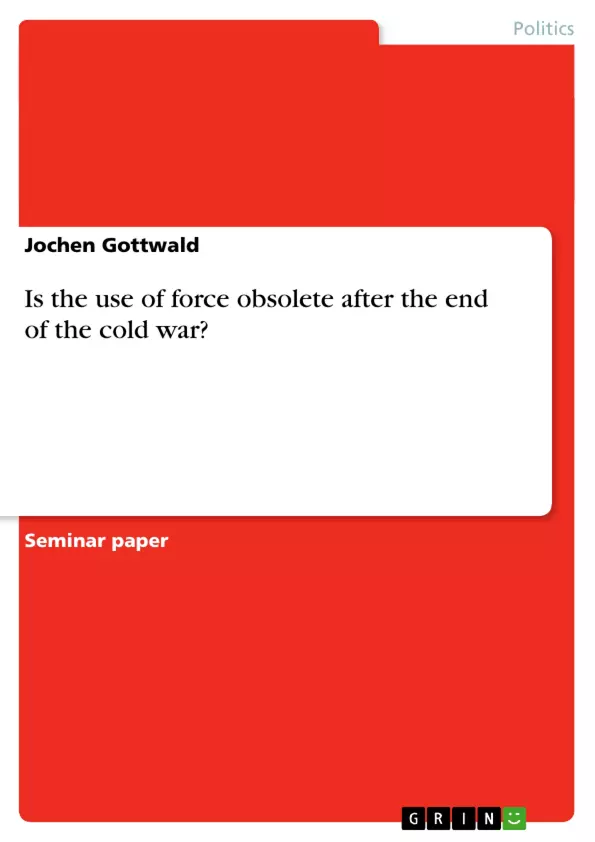This essay will ask about the future role of force in international politics by challenging the widely acknowledged perception that the end of Cold War gave impact to an essential paradigm shift of International Relations. It aims to explain why the scholars of International Relations, as well as the actors of global politics, face a widening gap between an accelerated implementation of international institutions and an increasingly troubled world, hit by the violent outbreak of ethnic and national conflicts, the rise of global terrorism and a new cultural and religious conservatism. Today we are in the really paradox situation that the bipolarity of the Cold War - long perceived as the most frightening constellation of the international system - can be seen as its stabilizing factor. To find the origins of the resulting disillusion it is necessary to ask for the reasons that made the western actors in the 1990′s believe that they succeeded. What made them believe that the end of Cold War meant the extermination of the use of force? Did the end of the Cold War really impose a paradigm shift! Did it really change the nature of International Relations?
The thesis provided in this essay will be: no! It didn′t! It has to be shown that Cold War only represented a common constellation of the international system, which can be often found throughout history; that the contemporary confusion exists because the paradigms of International Relations are based on a misinterpretation of Hobbes′ state of nature; and that the use of force is the only continuous variable and therefore can be seen as a paradigm of international relations. This approach aims to lead the debate back to an actorcentered model of international relations, which tends to reduce force by a more flexible, constructivist interpretation of political leadership in the background of the actor′s contemporary political and economic environment.
Inhaltsverzeichnis (Table of Contents)
- Clinching with a new disorder
- Cold War, its place in history and the emergence of non-traditional security issues
- Realism, its false impact on the concept of sovereignty and the problem of pre-emptive force
- Global Players and the use of force
- The use of force as a paradigm and its concept of sovereignty
- Conclusion
Zielsetzung und Themenschwerpunkte (Objectives and Key Themes)
This essay critically examines the prevailing assumption that the end of the Cold War marked a paradigm shift in international relations. It seeks to demonstrate that the use of force remains a crucial element in international politics, regardless of the changing geopolitical landscape. The essay argues that the Cold War was merely a specific constellation within the broader framework of international relations and that the use of force continues to be a central factor.
- The persistence of the use of force in international politics
- The limitations of classical paradigms of international relations in explaining contemporary conflicts
- The impact of non-traditional security issues like environmental pollution and resource scarcity
- The role of state actors and their motivations in the international system
- The need for a more flexible and constructivist approach to understanding international relations
Zusammenfassung der Kapitel (Chapter Summaries)
- Clinching with a new disorder: This chapter introduces the essay's central thesis, arguing that the use of force remains a fundamental element of international relations despite the end of the Cold War. The chapter explores the perspectives of different theoretical approaches to international relations, emphasizing the divergence between realist and more normative views on the role of force.
- Cold War, its place in history and the emergence of non-traditional security issues: This chapter examines the Cold War within the broader context of historical conflicts. It argues that the Cold War, despite its unique characteristics, represents a recurring pattern of international relations, and that non-traditional security issues like environmental pollution and resource scarcity existed well before the end of the Cold War.
Schlüsselwörter (Keywords)
The essay explores key concepts in international relations, including the use of force, the security dilemma, sovereignty, the role of state actors, non-traditional security issues, and the impact of the Cold War on the international system. The essay also focuses on the limitations of traditional theoretical paradigms in understanding contemporary international relations.
Frequently Asked Questions
Did the end of the Cold War lead to a paradigm shift in international relations?
The essay argues that no essential paradigm shift occurred; instead, the use of force remains a continuous and central variable in international politics.
Why is the post-Cold War world seen as more "disordered"?
The bipolarity of the Cold War acted as a stabilizing factor. Its end led to a rise in ethnic conflicts, global terrorism, and religious conservatism, creating a gap between international institutions and reality.
What is the "misinterpretation of Hobbes" mentioned in the text?
The author suggests that contemporary international relations paradigms are based on a flawed understanding of Hobbes' state of nature, leading to a confusion about the necessity of force.
What are non-traditional security issues?
These include environmental pollution, resource scarcity, and global health issues, which have existed long before the Cold War ended but are now more prominent.
Is the use of force obsolete today?
No, the essay's central thesis is that force is not obsolete but remains a fundamental element of how state actors interact in the international system.
- Quote paper
- Jochen Gottwald (Author), 2003, Is the use of force obsolete after the end of the cold war?, Munich, GRIN Verlag, https://www.grin.com/document/19473



